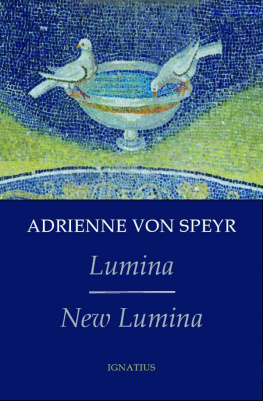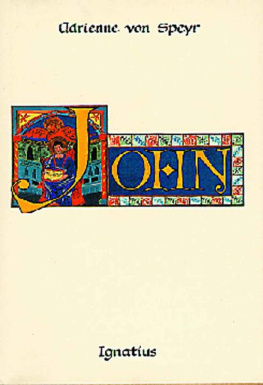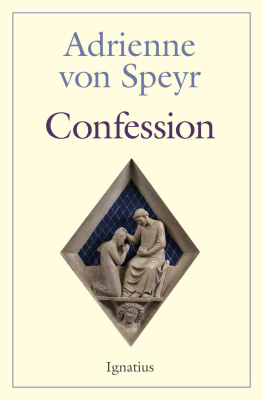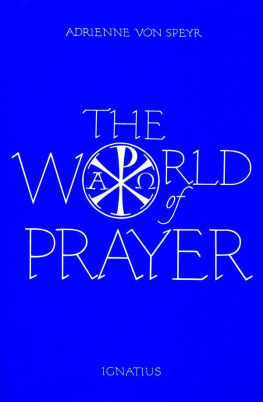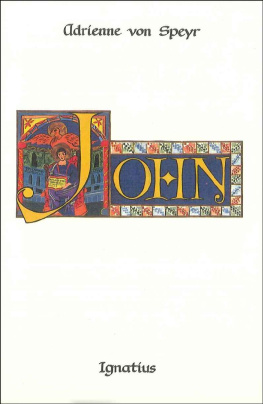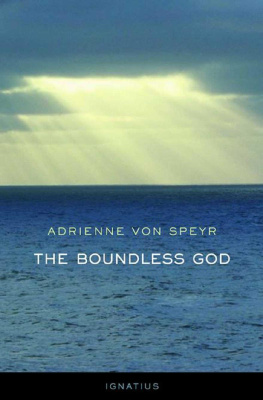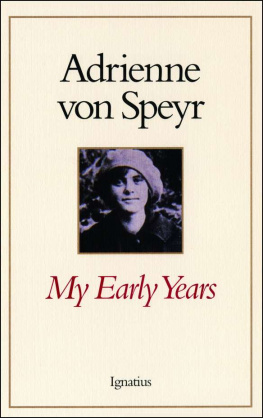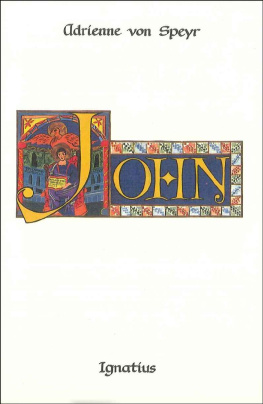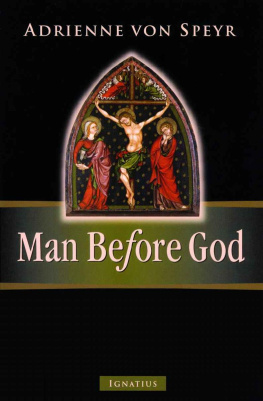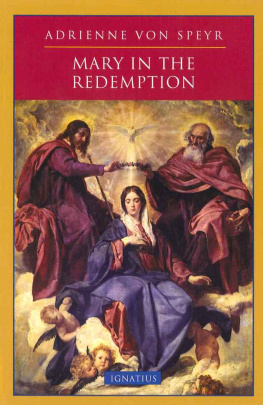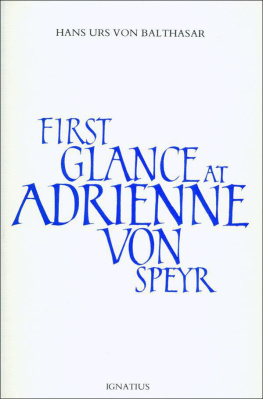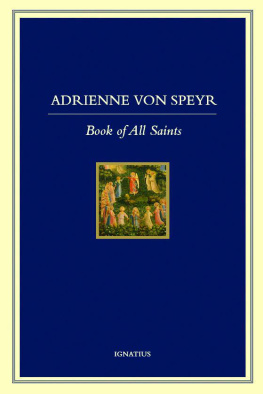Lumina and New Lumina
ADRIENNE VON SPEYR
Lumina
and
New Lumina
Translated by Adrian Walker
IGNATIUS PRESS SAN FRANCISCO
Original German edition:
Lumina und Neue Lumina
1969 by Johannes Verlag, Einsiedeln
Second, enlarged edition
Cover art:
Two doves drinking from a fountain .
Mosaic. Early Christian, ca. A.D. 425
Mausoleum of Galla Placidia, Ravenna, Italy
Cameraphoto Arte, Venice / Art Resource, New York
Cover design by Roxanne Mei Lum
2008 by Ignatius Press, San Francisco
All rights reserved
ISBN 978-1-58617-222-0
Library of Congress Control Number 2007928637
Printed in the United States of America
Contents
Prefatory Note
Christianity is either love of God, or it is nothing. As for everything elsedo not even the pagans do that, too? Before telling the Parable of the Good Samaritan, Christ asks the scribe to recite the Great Commandment with which the Old Covenant stands and falls. You have answered rightly. Do this, and you will live. Elsewhere, in Matthew, Christ himself recites it in answer to the question of which is the weightiest commandment of the Law. That there is a second like itto love your neighbor as yourselfis the consequence the New Testament draws from the Word of God, The creature embraces its Creator (whoonce he lovingly elects the creaturebecomes its covenant Lord) with the love of its whole heart, whole soul, and whole mind. And now my neighbor is included in that love. For God himself loves this neighbor as himself, and he became a neighbor, my neighbor, in order to prove it. The second commandment cannot be had without the first; it is what spills over when the first is fulfilled; if you invert the order, under whatever pretext, you are bound in good logic to give up Christianity.
It is precisely when God becomes man that he also becomes recognizable as the archetypal Love, which is triune in its very nature. Being (reality, the primordial ground of all tilings) and love coincide; from now on, to exist in harmony with being means: to love. Not just by contemplating, like the Indians and Greeks, but with a burning need to love archetypal Love in return. With a burning need to love personally, and that means: by praying, just as Jesus prayed, with the prayers of the Old Covenant on his lips; and just as everyone whose life has shone with Christian fire has prayed in his footsteps for the last two thousand years. And to love personally also means: with ones whole existence, stripped of self for Christian engagement, in mission to ones fellowmen and to the world, in order that both may be changed according to Gods mind and spirit. Political theology, they say nowadays. Yes, of course, but not just with actions. Rather, beyond actions, with the engagement of ones life, to the point of performing the supreme action (which makes sense only as a Christian gesture): substitutionary suffering. Passion does not replace action, because passion is Gods most active engagement on behalf of love. It does not replace action, because God uses it to initiate the Christian, who would do more for love if he could, into the mysteries of a reality whose overflowing efficacy lies beyond the Christians own capacities.
Even as a small child, Adrienne von Speyr (1902-1967), daughter of an old Basel family, wanted to become a doctor to help her fellowmen. Though she faced both an extremely hard fight against familial resistance and a series of illnesses that threatened to bring her plans to nought, she finally did achieve her goal. From childhood, she knew instinctively that she could truly help her neighbor, both professionally and humanly, only if she was in full harmony with God, and she failed to find this harmony in her conventional Protestant environment. She was in search of the unreserved openness to God thatafter her conversion in 1940she found in the sacrament of confession; she was in search of the union with the incarnate Lord that she was to receive from the Holy Mass; above all, she was in search of the permission to disappear completely into the objectivity of mission and the self-dispossession attendant on it. This permission was the gift she received in the Church, both as institution and as Christs body and bride.
After a number of years devoted to an exhausting professional practice, Adrienne faced decades during which illness increasingly prevented any outside work. In moments of leisure, she dictated meditations on the Bible, particularly on the Johannine corpus; between 1947 and the time of this writing, thirty-four volumes have appeared, and, contrary to the assertions of the occasional bookseller, they are by no means out of print. She spent her nights almost entirely in prayer and her afternoons quietly embroidering or (as she began to go blind) knitting. During such hours she would from time to time pull out a notebook and write down one of the thoughts that the reader will find in what follows; she then stuck the pages in the desk drawer where they were discovered after her death. In their artless concision, they offer distillations of the essence of her thinking, praying, and being.
Why publish them? Because we rarely hear today their native echo of the inmost mystery of Christianity. Because the paradox of ardent sobriety that they display bears the mark of authenticity. Perhaps simply in order to show that such things still exist.
Hans Urs von Balthasar
On the Second Edition
We add a second loose selection from the abundance of notes for unwritten books, aphorisms, and fragments left by Adrienne von Speyr. Like the first, it obeys no tight structure. Unlike the first, it begins with the personal, continues on through the objective, and finally issues in prayer.
Hans Urs von Balthasar
Lumina
I
Love of self is love that measures itself; love of neighbor is love that gives itself away. The only thing you can say about love of God is: it leaves behind scorched earth.
Anyone who knows the fullness of the light should not live in the twilight for the sake of thrift.
There are things that the understanding cannot grasp: they are too big for it, because their measure is love.
Love has no beginning, since before it became concrete, it was already present in the attitude of readiness.
When we make our own calculations, we need so many numbers and factors that any mistake is possible. The Lords calculation boils down to love.
Ultimate audacity: to want to love a personto say nothing of ones neighbor!as God loves him.
Christian love means two things at once: to recognize the Lord in ones neighbor and to recognize ones neighbor in the Lord.
The first step in learning to love others is the attempt to understand them.
To get or to understand people always means: to look at them from Gods angle, from the point of view communicated through Him. It is not a science, but a pure grace.
To love a friend in the right way can mean: to be able to prefer others to him in the Lord.
When someone dies, people often think: If only he could still speak. The real opinion of the living is something people are only rarely curious to find out.
Faith is a force, one so powerful that it cannot tolerate anything next it. How weak in faith we axe: we are constantly letting things outside of God take up space in us!
There is just as little center in what one has experienced as there is in virtually any living thing. It is a grace of God that, in the end, even life itself remains without a center.
Being and being Christian are an absolute unity for the believer. Trying to separate or even to delineate the two would be to give up living.
Faith enables Christian hope to be more than mere expectation and to become at every moment an immediate embodiment of love.
Next page
